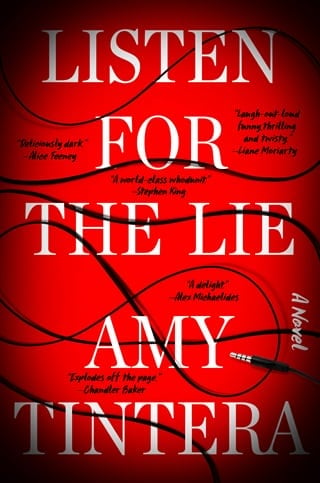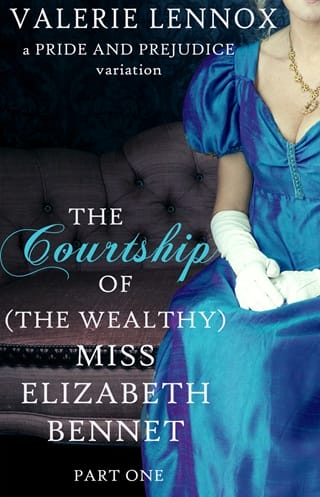Chapter 9
Nine
"Will you not remain with us, Mr Darcy?"
He turned to Mr Bennet and found the man looking up at him from his seat, smirking in amusement. Hurst was seated, while Bingley, looking abashed, quickly sat back down.
Displeased by his host's manners, Darcy stretched a bit before returning to his chair and accepting a glass of inferior port. The three other men began talking about the meal and the pleasure they had taken in it. They seemed in perfect unity; none was interested in discussing important matters between neighbours, such as water use, crop rotation, tenant issues, an impending marriage to a scoundrel…
"You are pleased with Miss Bennet's betrothed, sir?"
Darcy looked in amazement at Bingley. He had demanded his friend step back from his open admiration of Jane Bennet; he had not expected the most pleasant fellow he knew to ask an engaged woman's father a pointed question about her happiness!
In a display of shocking nonchalance, the older man shrugged. "He is as affable a man as God has made, and fully aware of his charms. Of course, I have met him only the once, when he joined us here at Longbourn for a se'nnight."
What father would agree to the marriage of a beloved daughter to a man he scarcely knew? Darcy set aside his disgust at such paternal carelessness. "They did not meet in Meryton? Mr Wickham is not well acquainted with the family, nor with you or Miss Bennet in particular?"
"They were introduced at the seaside and were swept away by love. Jane has inspired poetry in the past, but no man has professed such feeling for her as has Mr Wickham." Mr Bennet's mild expression betrayed neither disbelief nor humour, although Darcy could not miss the mocking tone in his voice. He lifted his glass towards Darcy. "I believe you know the man better than Jane or I. He speaks freely of your business."
"And my character."
"Would you care to enlighten me as to his? For I have welcomed you, the nemesis of my future son-in-law, into my home, and I am certain that if I write of it to him, he will not be pleased."
"I imagine not." Darcy's eyes canvassed the painting hanging behind his host—an oil of what he supposed must be one of Hertfordshire's finest views. Nothing like the seaside. He grimaced and once again thanked God he had not brought Georgiana with him to Netherfield. It was difficult enough to write to her of his doings here: How could he tell her that Wickham was to marry the lady she had befriended so briefly? He could not compound his sister's embarrassment with feelings of guilt. She was young, too na?ve to know better; Miss Bennet was a good seven years older than Georgiana. Had she never been exposed to a broader society, to develop discernment? Clearly her parents had been useless in their guidance, as well as distinctly incurious. Were they aware he was brother to the lady who had introduced the villain to their eldest?
Bingley coughed loudly, and Darcy became aware that Mr Bennet was awaiting the rest of his reply. He turned back to the room.
"Sir, I am aware of slanders made against me by Mr Wickham and can provide a thorough refutation of his charges, as well as proof, if needed. Beyond the known fact he was raised at Pemberley, as the son of the steward, I advise you give little credence to a word he has told you."
"Agreed!" cried Bingley. "Darcy is the best of men and has done Wickham a kindness by not expressing his own opinions and experiences of him. Perhaps you should allow him to defend himself—not that any defence is needed, of course."
Darcy was too well-mannered to roll his eyes but wondered at his friend's eagerness to speak up to Mr Bennet now rather than upon first hearing of Wickham's lies. Still, he had spoken a needed truth—given real advice—to the father of his ‘angel'.
Mr Bennet sighed and nodded in Darcy's direction. "I listened to little of what he said of you, although I must credit him for the fine detail of it all. He is far more exhaustive on your failings than he is on other subjects."
Darcy was heartened the man had some small share of scepticism. "Wickham was raised at my father's estate in Derbyshire, and my father—named as his godfather—sent him to Cambridge alongside me. He cared little for his studies or, to my knowledge, finding a career. As for the Norfolk estate… I have not been in contact with Wickham for more than a year, but I am unfamiliar with his connexion to that county."
"As am I." Mr Bennet was looking at him thoughtfully, tapping a finger against his chin as if weighing whether to make further enquiries. Then he shrugged, apparently lacking the intellectual energy for such pursuits. "I shall learn more when he next writes to me, eh?" He lifted his glass. "The mystery of it all."
That is all? No interest in a private discussion, nor overt concern about his eldest daughter's fate?
"Sir, much of what is a mystery to you?—"
The conversation went no further before it was made obvious, through loud resounding voices, that the ladies' endurance for one another had worn thin. As he followed the others into the drawing room, Darcy felt unsatisfied, guilt and frustration pricking at the edges of his thoughts. He took the seat next to Miss Elizabeth and sat silently while Mrs Bennet and her youngest daughters discussed the assembly two days hence. Miss Bingley was scowling at her brother; obviously she was impatient to end the evening and displeased at his clear eagerness to secure a set with Miss Bennet. Alas, Bingley's smile faded along with Darcy's mood when their hostess declared, "Dear Mr Wickham promises he will arrive in time to dance with Jane."
"No, Mama," said the intended bride, looking—Darcy thought—more than a little flustered. "Mr Wickham will be another fortnight at least putting his business to rights."
This was the first sign Darcy had seen of any concern about Wickham's return, and questions as to the urgency of the marriage, which he had previously repressed, surged in his mind. Is Miss Bennet carrying his child? Her mother appears nonchalant—is she aware?
"If they allow me to, I shall dance with all the Bennet sisters," declared Bingley.
As the younger girls clamoured to secure their places and Mrs Bennet drew Mrs Hurst into a conversation on shoe-roses, Darcy felt rather than heard Miss Bingley's barely stifled groan. Curious as to whether Miss Elizabeth noticed it, he turned and found her watching him.
"You have found my sister Jane of great interest tonight," she said quietly. "Do you wish her happy with Mr Wickham, or do you have concerns?"
"I wish happiness on those who deserve it."
Her eyes widened. "Jane deserves happiness."
"Of course," he said quickly. "No one wishes unhappiness on a sister." He bent his head closer to her and said quietly, "I have no wish to cause you pain, but I am curious about your sister's engagement to my former friend. It has surprised me."
"Surprise would describe much of the feeling here, albeit softened by his charming words and promises."
He had rightly credited Miss Elizabeth with perception and intelligence. "I am sorry for it. He is never at a loss for charming words."
"Except when it comes to you, sir. He is quite exhaustive in sowing doubt in your character. Are you equal to the task of sowing doubt in his?"
Uncertain whether he was being chastised, Darcy looked down to hide his expression. "More than equal, I would say."
"I am glad to hear it, although it is my duty to stand by my future brother and have faith in his character."
His character . In spite of the heat of anger he felt that the only person of worth he had thus met in this town could be taken in by Wickham, Darcy answered in a cool voice. "Do you believe him?"
"I hardly know what I should believe," Miss Elizabeth said in a near whisper, "for I fear it may diverge from what I wish to believe for the sake of my sister."
He turned to her, surprised and all too aware of how troubled her feelings must be.
"Lizzy, what are you going on about?" cried Mrs Bennet. "Kitty wishes to wear your green gown at the assembly."
With that, a mutual sign of eagerness to end the evening passed between both parties, and within minutes, coats were collected and the five guests from Netherfield departed. Darcy's head sank into the squabs of Bingley's carriage, and he wished he had ridden over; the exertion and danger of such a ride would relieve some of his frustration at being interrupted from his conversation with Miss Elizabeth. He would not have dared ask the question most pressing, but was it wrong to wish to know whether her sister was coerced? If he could help?
"You appear quite taken with the eldest Bennet girls, Mr Darcy. Your eyes never left them—particularly Miss Elizabeth during dinner—and I worried for your appetite." Miss Bingley's voice carried the affected intimacy that both amused and repelled him.
"It was a fine feast," he countered. In the darkness of the carriage, he could not see her expression, but his pithy reply appeared to shock her. He had already shocked himself with how much he wished to alleviate the pain he saw in Miss Elizabeth's eyes. He understood all too well the need to protect a beloved sister, and he would do what he could to determine whether George Wickham remained as much a rogue as in years prior.
It is nothing more than conferring assistance , he told himself, even as the memory of her expression lingered.
That was badly done. Insulting my future brother and challenging his enemy.
Elizabeth lay in bed in her dark room, staring blankly at the ceiling. Thoughts of chastisement and shame kept her far too alert to sleep, far too uneasy to read. The creaking floor prevented her from pacing about, so rather than risk waking anyone, she remained abed, her mind repeating the previous hours in company with Mr Darcy and the Netherfield party.
Such staring! He could not keep his eyes from Jane and from me, whether to puzzle out Jane's feelings or to avoid further interaction with Mama and my sisters, I cannot say.
And yet, she had behaved no better. Sitting there beside him, occupying him so he would not speak to Jane, had been unsettling. He was there, large and intimidating, and curiously soft spoken. He had smelled not of horse or leather but of some rich scent and could boast the smartest knot in his cravat that she had ever seen. He was far more interesting, in a deeply knowledgeable way, than any other young man who had recently graced Longbourn's dining table. And in his brief comments and questions, he clearly was interested in learning about Mr Wickham's current situation in life. As am I, but I stupidly lost that chance!
Rather than using the opportunity to discover more of Mr Wickham, about whom she had growing doubts—doubts she had all but confessed to Mr Darcy—she had questioned Mr Darcy's character and reminded him of the slurs cast by Mr Wickham. Foolish girl!
She could not explain her behaviour and was grateful no one—except perhaps Miss Bingley, who rarely removed her gaze from Mr Darcy—had noticed. Had she seen his expression harden and heard his voice turn cold? Closing her eyes, she breathed in slowly. She was disappointed in herself. Mr Darcy deserved better than the behaviour served him at Longbourn, especially from her. She would apologise when next she saw him and apply to him to provide whatever information he could on Mr Wickham. If Papa will not do it, I shall.
Mr Wickham was wrong about the window-seats. Not just wrong about the colour but about their very existence. If he prevaricated about such minor details, what else had he lied about?
 Fullepub
Fullepub 



